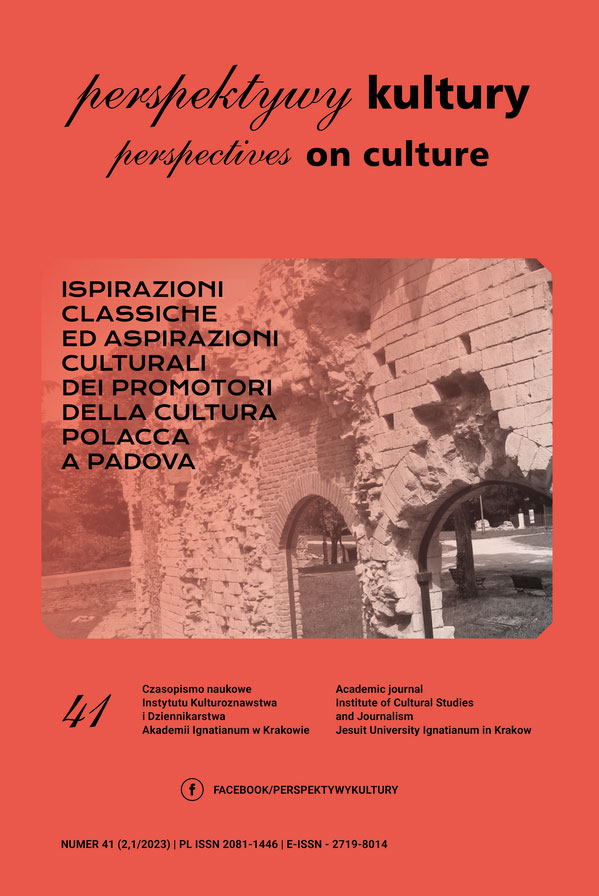A Lutheran, Maciej Vorbek-Lettow (1593–1663) and his Studies in Padua
Abstract
Maciej Vorbek-Lettow – Hetman Krzysztof Radziwiłł’s physician, and later one of King Władysław IV, left a memoir, Skarbnica pamięci [Treasury of Rememberance], in which he described his medical studies in Padua in detail. Many factors contribute to the great source value of this work: Vorbek-Lettow studied in Padua in 1613–1614 as a 20-year-old; he had previous educational experience from various academic centers (Vilnius, Gdańsk, Paris, Louvain); he held the position of syndic at Padua’s Università Artisti; he actively participated in the reform of the university, which gave non-Catholics equal rights in receiving doctorates as Catholics; and he took part in the first clashes in the guerra di Gradisca. The purpose of the article is to show the activity of Vorbek-Lettow in Padua and the Republic of Venice against the historical background, taking into account the role of the Paduan faculty of medicine for the development of medical science in the Polish-Lithuanian Commonwealth of the 16th–17th centuries.
References
Barycz, H. (1964). Joannicy Gabriel. In: Polski słownik biograficzny, vol. 11. Wrocław: Instytut Wydawniczy Ossolineum, 247–249.
Barycz, H. (1980). Petrycy Sebastian z Pilzna. In: Polski słownik biogra-ficzny, vol. 25. Wrocław: Instytut Wydawniczy Ossolineum, 703–707.
Brirely, R. (2020). Ferdynand II (1578–1637). Cesarz kontrreformacji, transl. K. Pachniak. Warszawa: Państwowy Instytut Wydawniczy.
Chachaj, M. (1979). Metryki zagranicznych uniwersytetów i akademii jako źródło do dziejów kultury polskiej (XVI–XVII w.). In: H. Zins (ed.), Stu-dia z dziejów epoki renesansu. Warszawa: Państwowe Wydawnictwo Naukowe, 37–56.
Ćwikliński, L. (1922). Padwa i Polska. Warszawa: Bibljoteka Polska.
Gierowski, J.A. (2003). Historia Włoch. Wrocław: Instytut Wydawniczy Ossolineum.
Frick, D. (2013). Kith, Kin & Neighbours. Communities & Confessions in Seventeenth-Century Wilno. Ithaca, London: Cornell Univesity Press.
Hilfstein, E. (1997). Sebastian Petrycy. A Polish Renaissance Scholar. The Polish Review, 42, no. 1, 78–93.
Lenart, M. (2014). Dzieje i znaczenie tzw. metryki polskiej w Padwie 1592–1745. Echa Przeszłości XX, no. 1, 143–164.
Lukšaitė, I. (2003). Reformacijos Lietuvoje raida ir evangelikų bažnyčių istorija XVI–XVIII a. In: A. Hermann (ed.), Lietuvos evangelikų bažnyčios. Istorijos metmenys. Vilnius: Baltos lankos.
Łempicki, S. (1980). Mecenat wielkiego kanclerza. Studia o Janie Zamoy-skim. Warszawa: Państwowy Instytut Wydawniczy.
Ongaro, G. (1981). La medicina nello studio di Padova e nel Veneto. In: G. Arnaldi, M. Pastore Stocci (eds.), Storia della cultura veneta dal primo Quattrocento al concilio di Trento, vol. 3, part III. Vicenza.
Pawlak, M. (1985). Z dziejów świetności Gimnazjum Elbląskiego w epoce Odrodzenia i Baroku. Gdańsk: Wydawnictwo Morskie.
Quirini-Popławska, D. (2009). Z Prus do Italii. Profesor uniwersytetu padewskiego Melchiorre Guilandini i jego podróże. In: D. Quiri-ni-Popławska (ed.), Mare inclitum. Oddziaływanie cywilizacji śród-ziemnomorskiej. Kraków: Wydawnictwo Uniwersytetu Jagiellońskiego, 139–159.
Schwarz, Z. (1986). Prywatne ogrody botaniczne a rozwój nauk przyrod-niczych w ośrodku gdańskim w XVI–XVIII wiekach. Kwartalnik Historii, Nauki i Techniki 31, no. 2, 411–444.
Sipayłło, M. (1987). Rassius Adam. In: Polski słownik biograficzny, vol. 30. Wrocław: Instytut Wydawniczy Ossolineum, p. 600.
Sokołowski, W. (1989). Instrukcja pedagogiczna dla Janusza Radziwiłła do szkoły zborowej w Wilnie. (Kartka z dziejów wychowania młodzieży szlacheckiej na Litwie w XVII w.). Rozprawy z Dziejów Oświaty, XXXII, 261–273.
Tenetti, A. (1967). Piracy and the Decline of Venice 1580–1615, trans. by J. and B. Pullan. Berkeley: University of California Press.
Vorbek-Lettow, M. (2006). Skarbnica pamięci. Pamiętnik lekarza króla Władysława IV, eds. E. Galos, F. Mincer, W. Czapliński. Wrocław: In-stytut Wydawniczy Ossolineum (the second edition).
Windakiewicz, S. (1888). Księgi nacyi polskiej w Padwie. Archiwum do Dziejów Literatury i Oświaty w Polsce, vol. VI, 1–78.
Windakiewicz, S. (1891). Padwa. Studyum z dziejów cywilizacji polskiej. Kraków: Księgarnia Gebethnera i Spółki.
Zemanek, A. (1996). Z dziejów botaniki renesansu – padewskie inspiracje polskich zielnikarzy. Kwartalnik Nauki i Techniki, 41, no. 1, 31–58.
Zemanek, A. (1998). Renaissance Botany and Modern Science. In: Z. Mirek, A. Zemanek (eds.), Studies in Renaissance Botany. Kraków: Polish Academy of Sciences, 9–47.
Copyright (c) 2023 Jesuit University Ignatianum in Krakow

This work is licensed under a Creative Commons Attribution 4.0 International License.
Autor, zgłaszając swój artykuł, wyraża zgodę na korzystanie przez Wydawnictwo Uniwersystet Ignatianum z utworu na następujących polach eksploatacji:
- utrwalania utworu w formie papierowej, a także na nośniku cyfrowym lub magnetycznym;
- zwielokrotnienia utworu dowolną techniką, bez ograniczenia ilości wydań i liczby egzemplarzy;
- rozpowszechniania utworu i jego zwielokrotnionych egzemplarzy na jakimkolwiek nośniku, w tym wprowadzenia do obrotu, sprzedaży, użyczenia, najmu;
- wprowadzenia utworu do pamięci komputera;
- rozpowszechniania utworu w sieciach informatycznych, w tym w sieci Internet;
- publicznego wykonania, wystawienia, wyświetlenia, odtworzenia oraz nadawania i reemitowania, a także publicznego udostępniania utworu w taki sposób, aby każdy mógł mieć do niego dostęp w miejscu i czasie przez siebie wybranym.
Wydawca zobowiązuje się szanować osobiste prawa autorskie do utworu.





